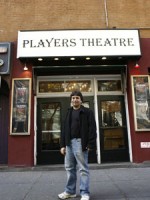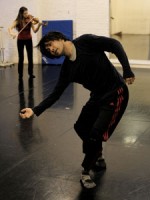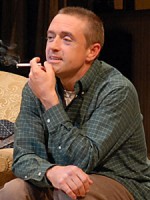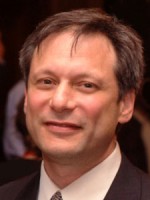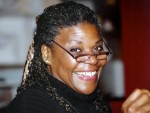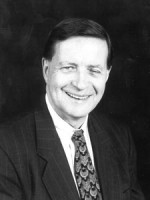Title
It's a Saturday matinee performance of The Selfish Giant, a Literally Alive Children's Theater production, at the Players Theater on MacDougal Street in Greenwich Village. After an introduction of the cast who will portray characters in this new stage version of the fairy tale written by Oscar Wilde, a marimbist strikes up a catchy march tune. The music, which combines a sing-song transparency with some clever phrasing and skillfully used color, draws the audience of children and their parents into the world of the stomping, sulky giant and his young neighbors who just want a place to play. Steal a glance at the musicians as the show progresses, and it's obvious the marimbist is also leading a small percussion ensemble that is the pit band. Peek at the program during scene changes, and you see that the marimbist is also the composer. What is perhaps not casually obvious is that the marimbist—make that marimbist/musical director/composer—is, additionally, the landlord/mortgage holder/man-in-charge of the whole venerable Players Theater building, where Literally Alive is among several dozen itinerant and full-time artist/tenants.
MICHAEL SGOUROS. When touring with a chamber group became "too much," he bought a Greenwich Village theater to provide a base for himself as a musician and for other projects he wanted to do.
(Photo by Carol Rosegg)TAKEHIRO UEYAMA. While Ueyama was dancing with the Paul Taylor Dance Company, a board member recognized his talent for choreography and offered to help him start his own company.
DAVID ALFORD. A passion to better serve his community led him to found the Mockingbird Theater in his native Nashville, to "champion Southern theater artists."
(Photo by Harry Butler)BEN DONENBERG. The actor's "journey with Shakespeare" began in the fifth grade and eventually led to his founding Shakespeare Festival/LA.
CLAUDIA POLLEY. Trained as a singer, she moved into the museum and visual arts arena, and was founding president of the National Association for African American Heritage Preservation.
(Photo by Stephen Brock)DUDLEY WILLIAMS. After 40 years with Alvin Ailey American Dance Theater he wasn't ready to hang up his leotard—so he helped form the Paradigm Dance Company, which creates dance repertory specifically for older dancers.
Body
"An impresario?" I ask marimbist/composer/theater owner Michael Sgouros (B.M. '89, percussion) later. "How did that happen?" I also asked a number of Juilliard graduates who have started performance companies, become producers or entrepreneurs, the same sort of question: How—and why—did you end up going from being part of the show to running the show? The impetus differs, from following a dream to feeling financial pressure to finding serendipity. Some who unexpectedly found themselves in charge skipped the training wheels, hopping directly onto the lead bike. Others made professional transitions as part of a more gradual learning curve. The course for nearly all has been filled with the gnarly twists and turns and bumps and bangs of learn-as-you-go. What gave them all fortitude, courage, and insight? For one thing, nearly all say that at the core, they are performers—so they are used to facing difficulties.
Sgouros, 42, tells me that his career as a percussionist took off nicely even before he finished school. "I was in a percussion group that started at Juilliard: Ethos Percussion Group," he says. "We worked steadily, playing chamber music venues all over. But after 15 years, all the touring got to be too much. I started thinking it would be great to find a place in New York that could sustain itself—and where I could have a base as a musician and for other projects I wanted to do. So I left the group, although I have stayed involved as a board member, and started looking at properties. A year later I found the Players Theater for sale."
And for $6.5 million, after some negotiating with real-estate brokers and mortgage bankers, it was all his—an inactive, 248-seat off-Broadway theater in need of renovation and jump-starting, with office and rehearsal space, and one regular tenant, the quirky Cafe Wha?, which is a Village institution. Oh, yes—the deal included middle-of-the-night emergencies such as a flood and a tenant who's locked out, as well as the need for constant networking to keep all the spaces filled and producing income. "The scariest thing is the weight of it. Sure, I could have a 9-to-5 job or an orchestra job," Sgouros says, "but by hiring some good people, fewer of those [day-to-day] problems come my way. It's taken a lot of my time, but each year, I get more of my time back." Time that he uses for his own children's percussion series, teaching—and new pursuits. "I never really thought about writing for a show, and I didn't know Literally Alive before they were looking for space and found us. And suddenly they also needed a composer." He's writing scores for several more of their shows in the 2008-09 season.
While Sgouros had some real-estate investment experience to rely on before he bought a theater, others have found themselves starting with little beyond the knowledge they have of their art form. Neither Takehiro Ueyama (Diploma '95, dance) nor Dudley Williams ('60, dance) even had a dream of starting a dance company. Williams, 70, knew from a very early age that he would dance. And that he did—in one of the most distinguished careers of any 20th-century American dancer. Retiring in 2005 after 40 years with Alvin Ailey American Dance Theater, though, he wasn't ready to hang up his leotard—and he was already onto his next move. Back in the mid-'90s, an overbooking snafu for a Dancers Over 40 event had landed him in a hastily arranged trio with Gus Solomons Jr. and Carmen de Lavallade—and it went so well that Solomons said, "How about we form a company?" It was a natural leap for Williams. "I said fine," he remembers. So the three of them became the core of Paradigm Dance Company, which Williams swears he does not run, nor even influence artistically. "I'm just there to dance," he says modestly. But Paradigm, showcasing mature artists, breaks new ground in creating a dance repertory specifically for older dancers, even premiering pieces that confront audiences with realities of aging and their own attitudes toward older people. So, of course, Williams leads by example and inspiration, performing the choreography of Solomons and others that celebrates artistic longevity and acceptance of changing physical abilities.
Ueyama, growing up in Japan, thought he would be a baseball player, until injuries halted that career plan while he was still a teenager. Even as he gravitated toward dance—from hip-hop break dancing to Juilliard, eight years in the Paul Taylor Dance Company, and then making his own dances—he says, "I knew nothing about running a company." But he remembers so clearly how a Bach concerto for oboe and violin changed his life. "I heard it when we were on tour in Rome, and it played over and over in my head. I did a piece to this music and showed it to Paul and some other people. They all said, ‘pretty good, you should keep doing this.'" Among those who recognized Ueyama's nascent talent as a choreographer was a Paul Taylor board member who offered to help with finances, as well as board and administrative structure, if he wanted to start his own company. That made the difference.
"I spent all my own money the first season to hire dancers and for theater rental. I'm not very good with numbers, and there were mistakes," Ueyama, 41, says of launching TAKE Dance Company in 2004. "Now things are much better. Even though company membership changes, dancers stay until they get a bigger gig, which I encourage them to do. But I have a board, and the members feel my pain. They know stress affects my work, so they have helped with finances and hiring a managing director, accountant, and others to take care of payroll tax, insurance, and those administrative things."
Ueyama believes a positive outlook propels him toward success. Indeed, TAKE Dance has already won him national attention for what The New York Times calls a "gift of ... big, bold movement ... freshly and distinctly his own." He says simply, "I surround myself with others who are positive. I trust myself, and I trust my dancers. And I have a lot of passion."
That word is echoed as I ask others about requisite underpinnings for grappling with the gritty details while keeping the big picture in focus.
"I was passionate that we should be serving our community better," says David Alford (Group 20, drama) who founded Mockingbird Theater in 1994 in his native Nashville, Tenn., "to champion Southern theater artists—writers, actors, directors and designers ... people who ‘could make it anywhere' but who had chosen to live outside the [traditional theater centers of New York and Chicago]." Yes, there was theater in his hometown, but mostly it seemed to focus on commercial standards set outside the region. He identified the artistic gap and started thinking of how to fill it. Actually, Alford had first thought about running a theater while still at Juilliard. "Part of my thought was that I would be instantly famous [as a New York actor] and then I could ride back to Nashville in clouds of glory." Well, not quite. But after working steadily in New York—while "spending a lot of time there being a Southern apologist"—he did head home in 1994 with his idea and a Fox Fellowship to help fund it. He found the book How to Start a Non-profit Corporation ("no kidding," he says) and two Juilliard friends, Paul Michael Valley and Tucker McCrady, to serve on a board of directors.
Over the next decade at Mockingbird, Alford, 43, served as stage director, actor, technical director, sound designer, dramaturg, writer, business manager ("well, I failed at that," he laughs), development director, and producer. "It was a great education. I accepted that this is what you have to do if you want to call your own shots. It was a raw experiment, and we took it as far as we could go only spending money on the production—never advertising—hoping that the quality of the work would be enough. And we did create a passionate following of a few thousand people." Instead of changing his philosophy (including more commercial productions that might attract Broadway or off-Broadway producers) or perhaps embracing advertising (and a larger budget), Alford closed Mockingbird in 2004 and took his experience to Tennessee Repertory Theater as interim artistic director for two years. "I didn't go to Juilliard to sit through board meetings," he sighs, "but that's what's required. I'm working now as an actor and doing some writing and directing. I like being in charge, but maybe a smaller project next time."
"I really just wanted to be an actor," says Ben Donenberg (Group 10, drama), but the "very interesting journey with Shakespeare" he began as a fifth-grader eventually led to his founding Shakespeare Festival/LA in 1986. Recalling his earliest experiences watching a PBS broadcast of Hamlet, writing a 50-page high school paper, and being bribed by a teacher to be in a student production, Donenberg remembers that he "had a physiological response to Shakespeare's verse, and I've been in love with it ever since." Fresh out of Juilliard, he landed in (what else?) a Shakespeare in the Park production of Henry IV, Part 2. But in 1984, when he wound up in Los Angeles to further his acting career, "I didn't quite resonate with the ethos in L.A.," he recalls. What to do? Take advice from an early mentor, Michael Langham, who said: "You have to remember the important connection between Shakespeare and your community."
And then he dared to dream of a larger stage and himself in charge of all on it. By chance, Leonore Strunsky Gershwin, the wife of lyricist Ira Gershwin, for whom Donenberg was doing some work, asked him what he wanted to do if he could write himself a check. "So I wrote myself a check for $3,000 from her, and then she hosted a lunch. I met people from the city arts council, from Citibank." And that was the beginning, in 1986, of free Shakespeare every summer in L.A. and other nationally recognized Shakespeare Festival/LA projects, such as Will Power to Youth, for at-risk youth, and Play On, an after-school program. "Our aesthetic is consistently relating to L.A.—that's our lens, and that's exciting. I've grown disinterested in generic American Shakespeare that can appear on any regional stage, because there is no such thing as a generic American." Shakespeare Festival/LA's casts are multiethnic; settings are in California neighborhoods and malls and freeways. "We wanted to demonstrate than Shakespeare is relevant—and we have. His mind and his plays are a mirror to our innermost souls. All he has written reflects what's true for each of us, even as our own individual truths vary. In creating productions that reflect the people, landscape, history, and current events of my community, I am fulfilling Shakespeare's vision." Now also a member of the National Council on the Arts, Donenberg has taken leadership training courses to develop networking and communications skills that have made the difference in running and raising the profile of his organization. "You learn to put yourself in other peoples' shoes. You cultivate respect for others."
Some might say that Claudia Polley (Diploma '71, voice) changed careers, moving from performing to visual arts. Once she sang Luciano Berio's latest works in New York, then sang back-up and disco in France. About 10 years ago Polley, now 59, moved into the museum and visual arts arena, first as founding president of the National Association for African American Heritage Preservation, then lead management consultant of the Museum of the African Diaspora (MoAD) in San Francisco, and now as an international museum consultant. But to her, it has all been a career evolution rather than abrupt change. "It all relates to telling a story," she says, explaining that her responsibilities included creating documents that defined the mission and vision of MoAD. Having guided that project through a thicket of community, board, and government meetings and requirements to consensus and a successful opening in 2005, she laughs about not heeding former Juilliard President Peter Mennin, who once told her that "arts and politics don't mix; you should just be a diva." "We need to be aware of society," she says. "Audiences are us, and we cannot perform in a vacuum. No matter what your medium is—being a backup singer or planning exhibitions—you have to connect with your audience." What about management skills? "Listen. Learn. Apply." Polley advises. "I didn't need to go to business school. Rely on your contacts and learn to use them, and one thing will lead to another. That all started for me at Juilliard."
No one I spoke with took an orthodox business approach to heading a business—perhaps least of all John De Witt (B.S. '57, M.S. '58, choral conducting), who has been legally blind since age 10. A choral conductor in New York after graduating from Juilliard, he volunteered in the library at radio station WBAI and then took an on-air job at WRVR (which was owned by Riverside Church until 1977) to supplement his income. His ear, voice, and musical knowledge took him up the radio ladder to networks and then to his own station in Chicago. "Besides getting to know a lot of musicians—such as Burt Bacharach, Richard and Karen Carpenter—I must have been picking up business skills because I had to sell [ad time] and manage a staff," he recalls. He later used those skills in a marketing position with the National Foundation for the Blind. Eventually he decided he could do a better job than they did with products to aid the visually impaired. "I thought I could help people in ways they couldn't, and that's when I decided to start my own company," he says. De Witt and Associates, headquartered in New Jersey, offers assistive technology training and support services nationwide, working with nearly all software and hardware products used by blind and low-vision consumers. His clients have included Amtrak, MetLife, Columbia University, and the U.S. Department of Veterans Affairs. De Witt has influenced both product development and legislation that have greatly improved quality of life for the visually disabled.
"I started with $1,000 in stock in a bedroom office, and now we are a marginally profitable company with 19 employees," he says. "I believe in exploring life with whatever you've got to explore it with. I've done it by always using my vision loss creatively—whether with music or computers. I guess I am a person of dreams." He pauses. "Don't ever be afraid to follow your dreams."

